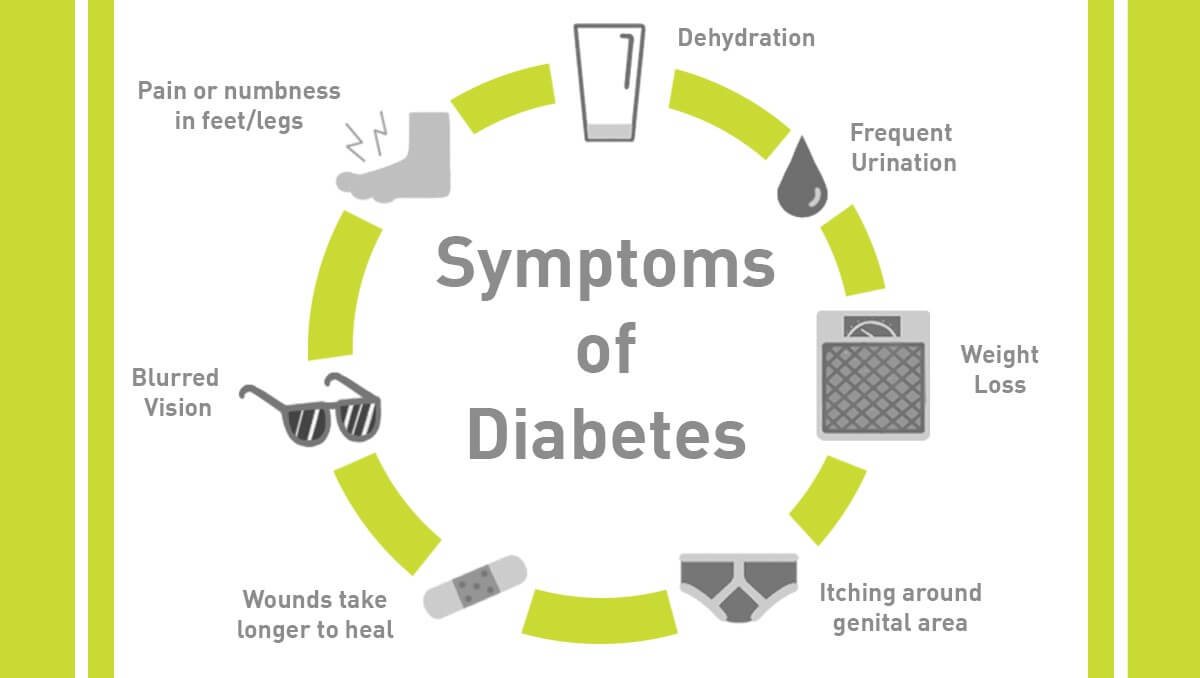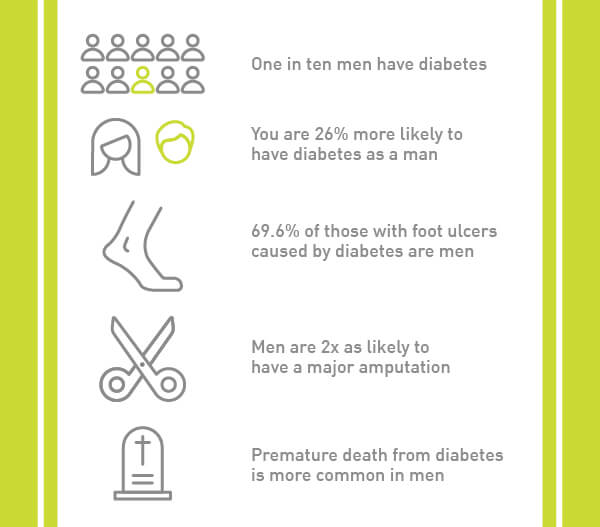By Rachel Lamb . 11/06/2018 · 7 Minute read
Did you know that men are 26% more likely to develop type 2 diabetes than women? Furthermore, they have a higher chance of suffering from severer symptoms, such as diabetic retinopathy, foot amputation and premature death as a result of the condition.
Therefore, we’re sure you’ll agree it’s essential for men and boys to know how to recognise diabetes symptoms.
What is diabetes?
Diabetes is a condition that affects a hormone called insulin, which is made in our pancreas. Insulin regulates the glucose in our blood, but diabetes impairs this, meaning that our body can’t break down carbohydrates the way it should, and glucose levels are often higher than normal.
When there’s a build-up of sugar in the blood, and it’s not going into our cells, they’re unable to function correctly. This can lead to health issues such as dehydration, nerve damage, damage to the retina in our eyes and, in some cases, kidney disease. There’s also a risk of the arteries hardening, which can then lead to a stroke or heart attack.
Type 1 diabetes is commonly diagnosed in childhood, although it can develop at any age, and is caused by a fault in the body’s immune response. Type 2 is linked to age, being overweight and can stem from a family history of type 2 diabetes.

Diagnosis and living with type 2 diabetes

Greg is our Group Commercial Director and was told he had type 2 diabetes a couple of years ago. Now living a healthier lifestyle, he successfully manages his symptoms and is in a 'normal range'.
Just before I turned 50, I thought I ought to go for a standard health check - as you do around this age. It was then that the doctor turned around and said, ‘you have type 2 diabetes’.
My initial reaction was just shock. However, the doctor explained that the condition could be controlled by what was in my diet, so I wasn’t prescribed any medication.
When I returned home, my first instinct was to panic and cut out sugar and sugary drinks completely. Although, I soon realised this wasn’t the best approach.
"...I thought if I don’t look after myself, who will?"
It did make me reflect on a lot of areas of my life, not just my diet, and I thought if I don’t look after myself, who will?
So, I started going to the gym and paying more attention to what I was putting in my body. After seeing how much sugar is in the likes of pre-prepared sauces and things like flavoured yoghurt, I began to cook a lot more from scratch.
After some time, you learn to understand the things your body does and doesn’t need - this doesn’t mean cutting everything out completely. I’ve chosen to stay away from sugary drinks, but treat myself to a chocolate bar from time to time.
"...knowing what the consequences could be if I’m not sensible drives me to live better."
Living with type 2 diabetes is a continual struggle and hard work, but knowing what the consequences could be if I’m not sensible drives me to live better. The important thing is to find a balance. You will slip off the slope sometimes, but be forgiving to yourself and take steps to find your way back.
As a result of my life changes, I've lost 23kg and am now seen to be in a ‘normal range’ with my insulin levels. I will never get rid of the condition entirely, but if I go back to making the wrong choices, I will be at risk of developing the symptoms once again.

Why are men more prone to developing diabetes?
Scientists haven’t discovered the exact reason why, but they do notice that to develop type 2 diabetes, men don’t need to gain as much weight as women.
There’s a theory it’s because men tend to store body fat around the liver and waist, whereas the places women store body fat are typically further away from any organs (e.g. hips and thighs).
Don’t stick your head in the sand: #TalkAboutDiabetes
If you’ve been diagnosed with type 2 diabetes, the worst thing you can do is try to ignore it, aka, go into ‘Diabetes Denial’.
The repercussions of ignoring diabetes can be severe. You could find yourself with health problems like glaucoma, kidney disease, or even foot ulcers, which can lead to amputation. However, as you can see from Greg’s story, with the right lifestyle changes, you can beat diabetes and live a healthy life!
There’s almost certainly going to be someone else in your life with the condition, so why not share tips with one another? You could even exercise together as this can help to manage your symptoms. Sometimes, just having someone who understands what you’re going through can make a world of difference.
If you’re struggling to adapt your diet independently, you can always seek the help of a healthcare professional. A diabetes dietitian can help you to create a meal plan tailor-made to you, advise the foods you should and shouldn’t be eating, and answer any diet-related questions you may have.
Resources
The Men’s Health Forum has created a 36 page, fully compliant, ‘man manual’ called Diabetes for Men, filled with useful information including:
- What exactly is diabetes?
- How diet may beat diabetes
- How physical activity can help
- How diabetes can affect sex
- How diabetes is treated
If you think taking part in forums could help, Diabetes.co.uk has hundreds for you to choose from, as well as an award-winning Low Carb Program that’s worth checking out.
Find out more about Men’s Health Week and Diabetes Week.
For information on our dietitian jobs give the Your World Dietetics Team a call on 02037515867.
Sources
https://beta.nhs.uk/conditions/type-1-diabetes/
https://www.nhs.uk/conditions/type-2-diabetes/
https://www.diabetes.co.uk/type1-diabetes.html
https://www.diabetes.org.uk/diabetes-the-basics
https://www.webmd.com/men/guide/diabetes-men#1
https://www.webmd.com/diabetes/guide/understanding-diabetes-symptoms#1
http://www.bbc.co.uk/news/health-15147999
https://www.nhs.uk/news/diabetes/men-develop-diabetes-more-easily/
https://www.diabetes.co.uk/lifestyle-changes-for-type2-diabetes.html











